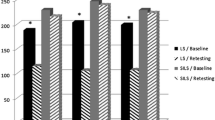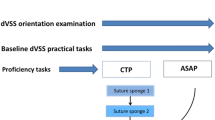Abstract
Background
Skills in single-incision laparoscopic surgery (SILS) are difficult to acquire. Simulation training leads to skill acquisition but circumstances about skill deterioration are unclear. The aim of this study was to evaluate skill acquisition and retention after single-incision laparoscopic simulation training.
Methods
From October 2013 to January 2014, 30 surgically naive participants underwent a SILS training curriculum and completed two validated tasks (peg transfer, precision cutting) with subsequent testing to assess acquisition of skills (baseline testing, BT). The participants were randomized into two groups and skill retention testing (RT) was measured after 4 weeks (group A) or 12 weeks (group B). Task completion was measured in time with penalties for inaccurate performance.
Results
A SILS training curriculum was established. 90 % of the participants completed the training successfully and reached the required levels of proficiency. Comparison of BT and RT revealed significantly better RT performances for peg transfer and precision cutting in group A (P < 0.05). These effects were not seen for RT in group B. Evaluating the RT performance of both groups, group A showed a non-significant trend for improved peg transfer and precision cutting compared to group B.
Conclusion
A proficiency-based training curriculum for acquisition of basic SILS skills was successfully established in our department. The results of this study indicate that acquired SILS skills are well retained for a short period without training (4 weeks) but a longer non-training period (12 weeks) resulted in a significant loss of acquired skills. For enhancement of surgical skills, specialised SILS training curricula could be developed for novices and inexperienced surgeons; however, continuous training is essential to maintain these acquired skills.



Similar content being viewed by others
References
Chow A, Purkayastha S, Aziz O, Pefanis D, Paraskeva P (2010) Single-incision laparoscopic surgery for cholecystectomy: a retrospective comparison with 4-port laparoscopic cholecystectomy. Arch Surg 145:1187–1191
Prystowsky JB (2005) Are young surgeons competent to perform alimentary tract surgery? Arch Surg 140:495–500 discussion 500–492
Barone JE, Lincer RM (1991) Correction: a prospective analysis of 1518 laparoscopic cholecystectomies. N Engl J Med 325:1517–1518
Scott DJ, Bergen PC, Rege RV, Laycock R, Tesfay ST, Valentine RJ, Euhus DM, Jeyarajah DR, Thompson WM, Jones DB (2000) Laparoscopic training on bench models: better and more cost effective than operating room experience? J Am Coll Surg 191:272–283
Peters JH, Fried GM, Swanstrom LL, Soper NJ, Sillin LF, Schirmer B, Hoffman K (2004) Development and validation of a comprehensive program of education and assessment of the basic fundamentals of laparoscopic surgery. Surgery 135:21–27
Islam A, Castellvi AO, Tesfay ST, Castellvi AD, Wright AS, Scott DJ (2011) Early surgeon impressions and technical difficulty associated with laparoendoscopic single-site surgery: a Society of American Gastrointestinal and Endoscopic Surgeons Learning Center study. Surg Endosc 25:2597–2603
Montero PN, Acker CE, Heniford BT, Stefanidis D (2011) Single incision laparoscopic surgery (SILS) is associated with poorer performance and increased surgeon workload compared with standard laparoscopy. Am surg 77:73–77
Rieder E, Martinec DV, Cassera MA, Goers TA, Dunst CM, Swanstrom LL (2011) A triangulating operating platform enhances bimanual performance and reduces surgical workload in single-incision laparoscopy. J Am Coll Surg 212:378–384
Santos BF, Enter D, Soper NJ, Hungness ES (2011) Single-incision laparoscopic surgery (SILS) versus standard laparoscopic surgery: a comparison of performance using a surgical simulator. Surg Endosc 25:483–490
Alevizos L, Brinkman W, Fingerhut A, Jakimowicz J, Leandros E (2012) Novice surgeons versus experienced surgeons in laparoendoscopic single-site (LESS) surgery: a comparison of performances in a surgical simulator. World J Surg 36:939–944
Sodergren M, McGregor C, Farne HA, Cao J, Lv Z, Purkayastha S, Athanasiou T, Darzi A, Paraskeva P (2013) A randomised comparative study evaluating learning curves of novices in a basic single-incision laparoscopic surgery task. J Gastrointest Surg 17:569–575
Pucher PH, Sodergren MH, Singh P, Darzi A, Parakseva P (2013) Have we learned from lessons of the past? A systematic review of training for single incision laparoscopic surgery. Surg Endosc 27:1478–1484
Acknowledgments
The authors thank the Royal Australasian College of Surgeon (RACS) for loan of the two FLS box trainers and their substantial support.
Disclosures
Drs. Varley, Choi, Kuan, Bhardwaj, Trochsler, Maddern, Hewett and Mees have no conflicts of interest or financial ties to disclose.
Author information
Authors and Affiliations
Corresponding author
Additional information
Martin Varley, Ryan Choi, Kean Kuan contributed equally to the study.
Rights and permissions
About this article
Cite this article
Varley, M., Choi, R., Kuan, K. et al. Prospective randomized assessment of acquisition and retention of SILS skills after simulation training. Surg Endosc 29, 113–118 (2015). https://doi.org/10.1007/s00464-014-3647-y
Received:
Accepted:
Published:
Issue Date:
DOI: https://doi.org/10.1007/s00464-014-3647-y




